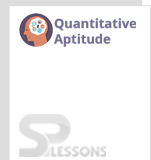 Introduction
Introduction
What is Quantitative Aptitude test?
Quantitative Aptitude is one of the prominent competitive aptitude subjects which evaluates numerical ability and problem solving skills of candidates. This test forms the major part of a number of important entrance and recruitment exams for different fields. The Quantitative Aptitude section primarily has questions related to the Simplification, Numbering Series, and Compound Interest, etc.
A candidate with quantitative aptitude knowledge will be in a better position to analyse and make sense of the given data. Quantitative Aptitude knowledge is an important measure for a prospective business executive's abilities.
The article SSC CPO Quantitative Aptitude Quiz 18 provides Quantitative Aptitude questions with answers useful to the candidates preparing for Competitive exams, Entrance exams, Interviews etc. The article SSC CPO Quantitative Aptitude Quiz 18 will assist the students to know the expected questions from Quantitative Aptitude.
 Quiz
Quiz
1. In how many ways can the letters of the word INDIA be arranged, such that all vowels are never together?
- A. 48
B. 42
C. 28
D. 36
- A. 80%
B. 75%
C. 78.66%
D. 71.25%
- A. 26.2 km
B. 25.7 km
C. 23.2 km
D. 26.67 km
- A. [latex]\frac{1}{2}[/latex]
B. [latex]\frac{3}{5}[/latex]
C. [latex]\frac{2}{3}[/latex]
D. [latex]\frac{2}{5 }[/latex]
- A. 4 kmph
B. 6 kmph
C. 5 kmph
D. 8 kmph
Directions ( 1- 5): Find the odd one out
1. 125, 106, 88, 76, 65, 58, 53
- A. 88
B. 106
C. 125
D. 76
- A. 99.6
B. 96.2
C. 97.5
D. 98.25
- A. 20.68
B. 20
C. 20.12
D. 20.5
- A. Thursday
B. Friday
C. Wednesday
D. Sunday
- A. 4 hours
B. 6 hours
C. 2 hours
D. 1 hours
1. While calculating the edge of a square, a worker makes an error of 2% in excess. What % error does he make in calculating area? (%)
- A. 4.04
B. 4
C. 40.4
D. 4.004
- A. Rs 12,420
B. Rs 18,040
C. Rs 18,942
D. Rs 12,628
- A. 1:6
B. 1:3
C. 6:1
D. 3:1
- A. 3
B. 6
C. 11
D. 12
- 32
B. 20
C. 24
D. 16





